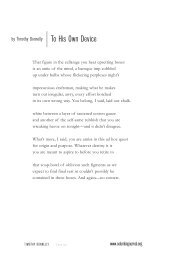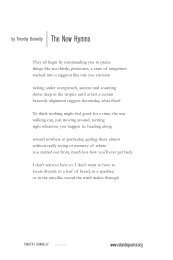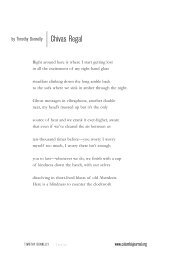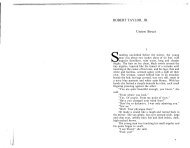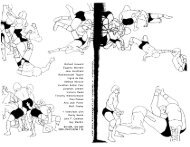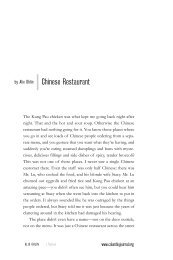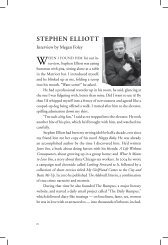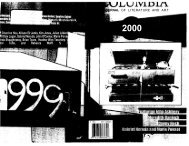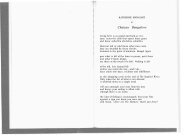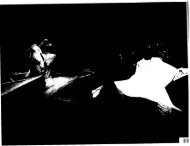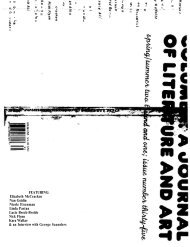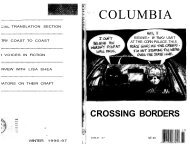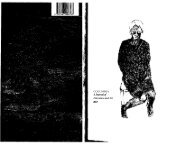Issue 42 - Columbia: A Journal of Literature and Art
Issue 42 - Columbia: A Journal of Literature and Art
Issue 42 - Columbia: A Journal of Literature and Art
You also want an ePaper? Increase the reach of your titles
YUMPU automatically turns print PDFs into web optimized ePapers that Google loves.
soldiers <strong>and</strong> militiamen might interrupt months <strong>of</strong> rape <strong>and</strong> sexual<br />
torture to take their victim to the hospital for an abortion <strong>of</strong> her<br />
husb<strong>and</strong>'s child. It's startling to realize that at the height <strong>of</strong> the<br />
genocide Rw<strong>and</strong>a's hospitals were still functioning, treating old<br />
people with pneumonia, children with broken arms. And, <strong>of</strong> course,<br />
delivering babies.<br />
What was the meaning <strong>of</strong> that gesture? On one level, the abortion<br />
was a continuation <strong>of</strong> the violence these men were inflicting on their<br />
captive, an intensification <strong>of</strong> it, a rape committed in the deepest<br />
parts <strong>of</strong> her body. As a Catholic, the woman would experience it as a<br />
murder <strong>of</strong> the life within her, <strong>of</strong> her husb<strong>and</strong>'s life, because it was<br />
his baby they were killing; they were killing him all over again. And<br />
at the same time, she would know that she was being spared, since<br />
it wasn't uncommon for genocidaires to terminate the pregnancies <strong>of</strong><br />
Tutsi women by cutting them open <strong>and</strong> ripping their unborn babies<br />
from their wombs. And so, at some point in the procedure, perhaps<br />
only for a moment, she might feel a trelnor <strong>of</strong> gratitude, <strong>and</strong> in recollection<br />
this gratitude would be the most terrible thing <strong>of</strong> all.<br />
If I go before the court, if I tell them what happened, ifI say what was<br />
done to my body, people will mock me. All I want to say is that they made<br />
me suffer. I want to tell the story <strong>of</strong> my suffering. And I want the one who<br />
raped me to underst<strong>and</strong> that he tortured me, that he's guilty. I want him to<br />
underst<strong>and</strong> what he did - freely, without being forced - I want him to<br />
admit his blame.<br />
The woman who told me this story was named Athanasie M. She<br />
was 45, with a h<strong>and</strong>some oval face that had begun to s<strong>of</strong>ten with<br />
age <strong>and</strong> very large dark eyes that looked even larger because <strong>of</strong> the<br />
dark circles beneath them. The whole time she spoke she held my<br />
eyes with hers. Once she had been a girl on one <strong>of</strong> the thous<strong>and</strong>s <strong>of</strong><br />
haystack-shaped hills that make up the Rw<strong>and</strong>an l<strong>and</strong>scape <br />
Rw<strong>and</strong>a, pays des milles collines - destined for a life <strong>of</strong> farming beans<br />
<strong>and</strong> sorghum. Against all expectations she had gotten an education<br />
<strong>and</strong> become a gym teacher at a polytechnic in Kigali. She had married,<br />
borne children. And then the life she had won for herself had<br />
been torn asunder <strong>and</strong> she had been turned into a sort <strong>of</strong> domestic<br />
animal, naked <strong>and</strong> speechless, kept alive only to be abused until it<br />
would be time to kill her. It seemed a miracle that she could speak.<br />
But she could write; she had a journal that she had written about her<br />
ordeal. "Each page," she said, "is a thous<strong>and</strong> tears." Now Athanasie<br />
worked at a women's center counseling other survivors <strong>of</strong> rape <strong>and</strong><br />
sexual torture, many <strong>of</strong> whom were sick with AIDS. In this regard,<br />
she considered herself fortunate. As a result <strong>of</strong> what had been done<br />
to her she could no longer perform any kind <strong>of</strong> physical labor, not<br />
even sweep a floor, but she didn't have the virus <strong>and</strong> could look forward<br />
to a long life. Perhaps it's better to say that she could anticipate<br />
a normal lifespan, which for a Rw<strong>and</strong>an woman in 2002 was<br />
46.8 years. 2<br />
I had been recommended to Athanasie by someone in the<br />
States, <strong>and</strong> when our interview was over she told me, "When you see<br />
David, you must remember to tell him how fat I've gotten." The<br />
pride in her voice took me aback until I remembered the possible<br />
connotations <strong>of</strong> thinness.<br />
The clinic was a complex <strong>of</strong> low grey cinderblock buildings decorated<br />
inside with the drawings <strong>of</strong> the clients <strong>and</strong> their children, crude<br />
productions <strong>of</strong> crayon, glitter <strong>and</strong> con- ..<br />
struction paper mounted on the walls<br />
with yellowing tape. When I left, a group<br />
<strong>of</strong> women was dancing in the earth yard.<br />
They were welcoming some visitors from<br />
a Canadian aid organization. The dancers'<br />
movements were fierce, strutting; they<br />
held their arms out from their sides, their<br />
fingers splayed <strong>and</strong> quivering, <strong>and</strong> lifted<br />
their knees high, like wading birds.<br />
Drums sounded. The women dipped,<br />
took a step forward, a step to the side, a<br />
step back, each pent inside her square <strong>of</strong><br />
an invisible grid drawn on the red earth.<br />
Some <strong>of</strong> theln looked quite old, their faces<br />
seamed, their eyes dim. Their limbs might<br />
have been made <strong>of</strong> twisted rope. One<br />
woman had only one leg, on which she<br />
The women<br />
dipped, took a<br />
step to the side,<br />
astep back, each<br />
pent inside her<br />
square <strong>of</strong> an<br />
invisible grid<br />
drawn on the<br />
red earth.<br />
hopped unceasingly, as if trying to pound a stake into :he ground. Up<br />
<strong>and</strong> down she leapt, grinning <strong>and</strong> triumphant <strong>and</strong> ternble. I suppose<br />
she was trying to proclaim victory over her disfigurement, but to me<br />
she seemed like a reproach to the world <strong>of</strong> the whole.<br />
A few weeks earlier, at a cocktail party at the American Club in<br />
Kigali, I'd been introduced to a man who worked for a Christian<br />
conflict-management organization. He was running reconciliation<br />
workshops. Reconciliation was a word you heard a great deal in<br />
Rw<strong>and</strong>a. You heard it from government <strong>of</strong>ficials, including elnployees<br />
<strong>of</strong> the eponymous Unity <strong>and</strong> Reconciliation Commission, <strong>and</strong> the<br />
spokespersons <strong>of</strong> victims' groups, from ex-detenus, perpetrato:s who<br />
had served their time in prison, <strong>and</strong>, more rarely, from rescapes, the



